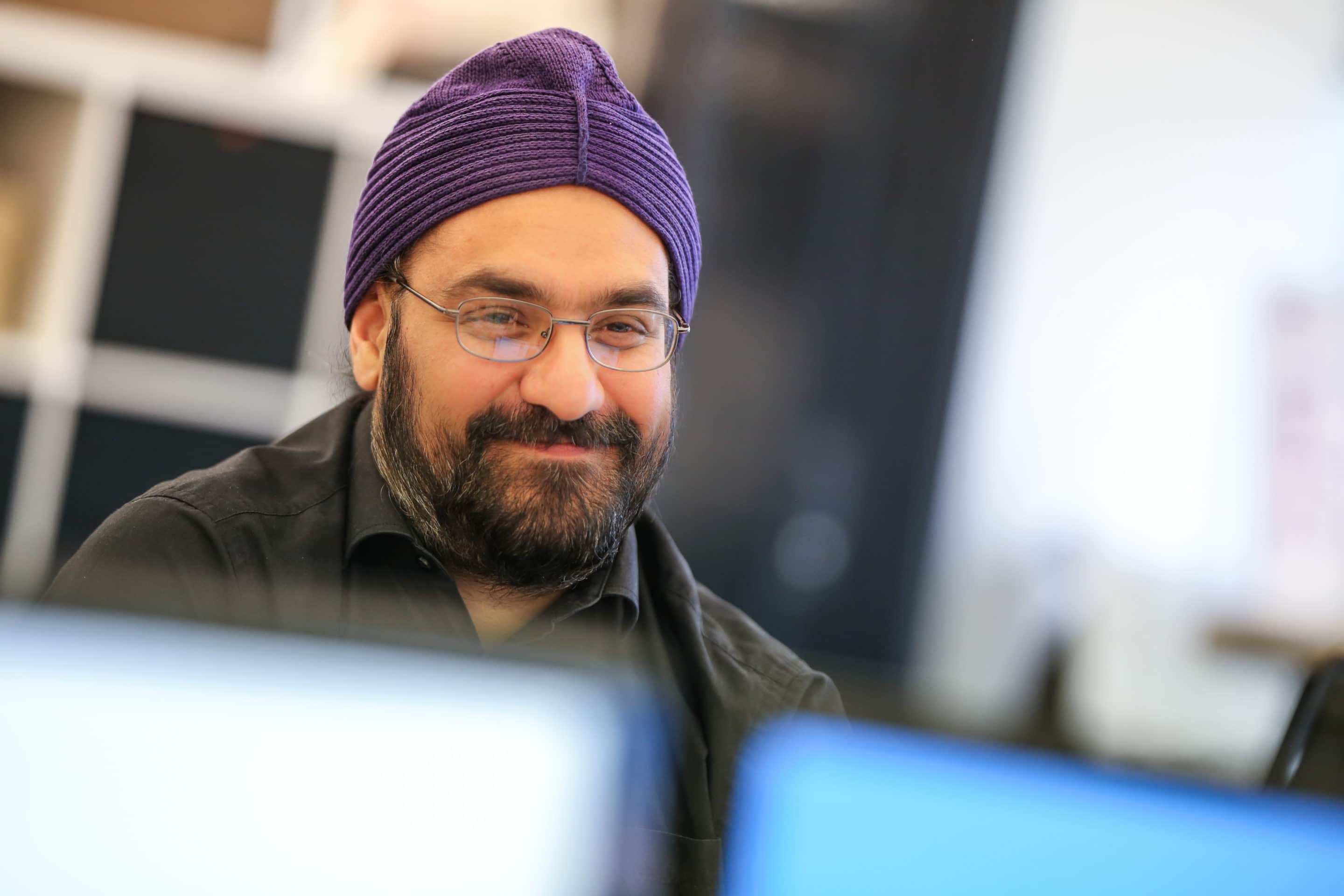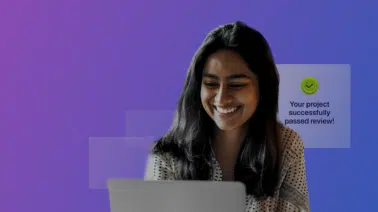Nimit Sawhney’s company Voatz is pioneering the use of blockchain technology to help overseas military personnel vote securely in West Virginia.
 For some, career choice seems like a foregone conclusion, as if they were born to it. For others, a career is something one ends up in as the result of choices made along an uncertain path. For still others, a career is a way to make a living doing something you believe in. For Nimit Sawhney, it’s all three, and then some. His career journey began in 1984, the moment the Prime Minister of India was assassinated. He was just a child, and couldn’t have known then the influence this terrible event would have on his life, but today, he credits that experience for motivating him to pursue the work he is now engaged in.
For some, career choice seems like a foregone conclusion, as if they were born to it. For others, a career is something one ends up in as the result of choices made along an uncertain path. For still others, a career is a way to make a living doing something you believe in. For Nimit Sawhney, it’s all three, and then some. His career journey began in 1984, the moment the Prime Minister of India was assassinated. He was just a child, and couldn’t have known then the influence this terrible event would have on his life, but today, he credits that experience for motivating him to pursue the work he is now engaged in.
“Some of the things I saw then as a little kid were shocking—just the image of someone forcing you to vote at gunpoint. It was scary at the time and the image really stuck in my head, though I didn’t understand the magnitude of it until I grew older.”
Nimit is the co-founder of a company called Voatz, which is pioneering the use of blockchain technology to secure modern voting platforms.
In creating our new documentary series Built on Blockchain, our goal was to seek out and engage with the most innovative thinkers, the most passionate practitioners, and the most ardent evangelists of this powerful emerging technology. We spoke with Nimit to learn more about his history, his company, and his embrace of blockchain technology.
In introducing your story to our community, we’ve shared some details about your childhood, and the assassination in 1984. It’s clear you learned hard lessons early on about the importance of secure elections. Can you tell us a bit more about how these lessons inform your thinking today?
It’s incumbent upon us to keep evolving, keep learning, and keep enhancing our concept for democracy. That’s a strong driver for us. Regardless of your political affiliation, if more people vote, if everyone votes, then that’s a fair fight. If you lose, it was a clash of ideas, and you can accept you lost the argument, and you can move on. But if people who are eligible to vote don’t, then it doesn’t seem like a fair fight, and it feel likes a flawed system. That’s a big driver for us. Can we make it easier for people who aren’t voting to do so, in a very secure way?
You mentioned your “concept” for democracy—can you explain what you mean by that?
To put it very simply, for me democracy means a political system where the citizens of the state have a final say on how they’re governed, and how systems that are external to them impact their daily lives. I think being free to express our ideas, our creative potential is, in many ways, a natural human instinct. So any form of government or political system which prohibits that in any way seems unnatural to me.
Is that sentiment at the heart of Voatz’s mission today? Do you see your company as being engaged in the preservation and defense of a democratic political system?
What we really want to do is enable every citizen, wherever they may be, whichever country they reside in, to have an easy access to voting, regardless of their position in society. And we want them to be able to do that with an electoral infrastructure that is resilient to interference and disruption. I think, for a long time, we haven’t really had systems that are built with that concept in mind. And we really should be finding a way to make it work. You can’t just say “we’re not going to do voting on the internet because it’s too great a risk.” We should be trying to find a way to use the technology, answer those concerns, and enjoy the benefits of what a new system can do.
You say we should be trying to find “a new system”—can you tell us a bit more about what you see as being the problems with the existing one?
One of the big problems we see with the current system of voting is that when you vote on paper, there is no way to have an absolute guarantee that your vote was counted correctly and recorded as you intended it to be. You need to implicitly trust the system, and trust that someone will count your ballot in accordance with what you intended. That’s a lot of trust. We see blockchain as a way to build that trust.
The idea of “electronic voting” doesn’t necessarily equate to building trust though, does it?
The problem with electronic voting that we’ve always had, of course, is that you have to trust the creator of the software. That’s hard. And if you’re doing it on a web browser or a computer you don’t control, that’s even harder. But for the first time now, you can use a controlled device—a smartphone—and use its own security systems, then with the blockchain, you can implement a mechanism where you don’t have to trust the creator of the software. Instead, it’s basically running on the power of mathematics.
This concept of trust comes up repeatedly within conversations about different applications of blockchain. Can you tell us more about your thoughts on this?
Trust is a fascinating subject for us. It’s a fundamental concept in all of our daily lives. But even more so in the case of an election, because—when we vote—it’s as much an emotional decision as a logical one. And there’s a lot at stake—both personally, and for the wider community.
When we started, we learned a very hard lesson. We had a casual conversation with a set of voters, and we were told, point-blank, that they would never use our system because they simply don’t trust us.
“You can’t just create a fully-formed solution and force it on people. You need to build trust brick by brick.”
How did you begin to build that trust? After all, you can’t exactly “beta” an election!
What we did is, we started working with colleges and universities for their student government elections. Then we began working with both major US political parties on their internal elections. We started working with labor unions, non-profits, churches, school board associations. Most of those organizations don’t need the military grade security we have on the platform. But it was important for us to go through that process to start building trust. If you’ve voted in your union election, in your college, and then suddenly in your local town elections, there isn’t such a big leap of faith.
That can raise a lot of challenges for a startup, because we have limited money, and we have investors who expect us to do things very quickly. And our approach goes completely against this kind of timeframe. So we tried to do a lot in parallel, so that we’ve already worked on around 30 elections so far. And the West Virginia project evolved out of that exercise, to become the most high-profile implementation so far!
I’m glad you brought up West Virginia, as that’s a project we’d love to hear more about! As part of our work on our Built on Blockchain documentary series, we spoke with Donald Kersey, the Director of Election in West Virginia, who had this to say on their motivation to explore a new system:
“When it comes to our uniformed service members, they don’t have the same kind of access to our polling places that people here in the state do. And they don’t have scanners or fax machines or printers that you would need under traditional electronic ballot delivery processes. Which is why we were willing to break down the barriers and do something that’s completely new.” —Donald Kersey, Director of Election, West Virginia
Can you tell us about your company’s pilot in West Virginia? Why did you chose West Virginia, and what have you done there?
For the West Virginia elections, we focused on two counties. And specifically, with those counties, on overseas military voters and their family members living overseas. Across the whole of the US, West Virginia has one of the highest percentages of its population serving in the military. So it made sense to focus on that use case, because of the challenges that service members can face when they’re trying to cast their vote when they’re posted overseas.
I understand your company was able to provide a new way for them to cast their votes—what was the solution you offered?
The main way they could vote through our system was through their smartphone—so either an iPhone or an Android, above a certain model configuration. They used that to go through a verification process using their phone’s biometrics capabilities. They could access the ballot, and submit their ballot. On the platform side, we used the Hyperledger, an open-source framework championed by the Linux Foundation, IBM, and others. This means we could build in the governance structure we needed to, and create a virtual model of how elections are physically conducted in the US right now.
Had this been done anywhere before? Combining blockchain, biometrics, and smartphone technology in this way?
It was actually the first time that mobile blockchain-based infrastructure was used to record votes, as well as biometric capabilities. And because of the technology, it was the first time that overseas voters were able to vote without having to give up their right to a secret ballot. Usually, voters from overseas have to request an absentee ballot by mail. Or they have the ability to request an electronic ballot, where they return it as a PDF via email or fax. All of those options present security concerns—how secure is a postal ballot, for example?—and all require the ballot to, in some way, identify the individual voter.
What do you say to people who are critical of using blockchain for elections?
I think for the people who don’t believe that the blockchain is a good fit for elections, I think our first response to them is that we’ve tried for the last 15 or 20 years to build internet voting systems to support remote voting. And neither of those have gone mainstream because of some very strict security challenges. And while blockchain isn’t the only way to theoretically accomplish this—you could build other systems that could solve the same challenges—nobody has done it so far. Now that we have a vehicle that could solve these critical issues, why not give it a try? It’s still an experimental technology. Nobody is claiming that everything is perfect yet. But it seems far more promising than anything else that’s been tried in the last 15 years.
“There are people now saying that elections and blockchains can’t work together, they were the same ones who a few years ago were saying nobody would ever create a functional blockchain. Now they’re surprised that a thing like Bitcoin or Ethereum actually works.”
I think theoretical skepticism is fine, and we are respectful of that, and try to just let our outcomes speak for themselves.
For a great many people, blockchain and cryptocurrency are nearly synonymous concepts. But by nature, cryptocurrencies are decentralized and essentially permission-less, which would seem to run counter to what elections are all about. How do you reconcile all that?
Well, let’s take the example of Bitcoin or Ethereum. Those are public networks, and completely permission-less for the most part, which means it’s a free-for-all. Anybody, anywhere in the world, can participate in that network.
Think, for example, if we were to run an election on the Bitcoin network. How comfortable would you be knowing that more than half of the validating entries are in a country that is potentially hostile to American democracy? I can imagine election officials here would be very uncomfortable doing that. You need a level of governance where you run an election on a public, somewhat permission-based network, which is accessible in the continental United States, and where anybody in the US, any citizen, any resident, can participate freely.
So “governance” means, basically, validating who has the right to vote, is that correct?
Who votes depends on whether you’re actually a citizen, and whether you have the right to vote. And who validates the vote is a matter of some governance—where you want to make sure it’s a non-partisan entity. Somebody who is looking for malicious intent, or too much financial interference.
There may be a point in the future where there are so many external governance tools built on the blockchain that it’s perfectly safe to run an election on a Bitcoin or Ethereum -like network. But we’re not there yet. If we want to use the technology now, we should be trying an intermediate approach. In our humble opinion, that should be a public network with permissions and governance built in.
We saw recently in an article from BlockTribune that you’ve just had a successful test run, and you’re now gearing up for the November elections! Here’s an excerpt from that article:
“West Virginia Secretary of State Mac Warner approved the test pilot for the May Primary Election in two of the state’s 55 counties (Harrison County and Monongalia County).
Voters from six countries participated in the May test – which provided an opportunity for independent audits of the blockchain and biometric technology utilized by the Voatz app.
After a thorough review of the Voatz audits, Secretary Warner has authorized a second and expanded test pilot to take place in the November general election. In the second test pilot, 24 of the state’s 55 counties will participate.”
That’s great news!
So far, the data we have is immensely positive, and we feel that this is a very promising direction to go in.
It’s all very exciting, and we thank you for sharing your insights with us! We’re looking very forward to the November elections, and to connecting afterwards to hear your perspective on how everything goes. On behalf of our readers, our community, and our Blockchain Developer Nanodegree program students, thank you!



